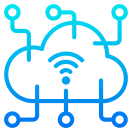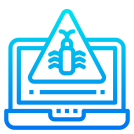Technical Support Specialist Training

Technical Support Specialist Training
Available:
In Stock
$198.00

Training Formats: Instructor-Led, Self-Paced
Duration: 6 Days
Activities/Labs:
- Analyze Malicious Network Traffic
- Analyze SQL Injection Attack
- Applying Filters to TCPDump and Wireshark
- Auditing Service Accounts
- Auditing Service Accounts and Setting Up Automated Log Collection
- Baseline Systems in Accordance with Policy Documentation
- Block Incoming Traffic on Known Port
- Blue Team - Patch Analyst (DEMO LAB)
- Comparing Controls
- Conduct Root Cause Analysis for System Crashes
- Conduct Supplemental Monitoring
- Control Assessment and Evaluation
- Creating a List of Installed Programs, Services and User Accounts from a WIN2K12 Server
- Denial of Service PCAP Analysis
- Dynamic Malware Analysis
- Event Log Collection
- Firewall Setup and Configuration
- Host Identification Scanning with Linux
- Host Identification Scanning via Windows
- Identify Access to a LINUX Firewall Through SYSLOG Service
- Implement Single System Changes in Firewall
- Installing Patches and Testing Software
- Intro to Linux - Routing and SSH Tunnels
- LNX101 - OpenSSH Installation, Configuration, and Hardening
- LNX101 - Setting Up a Firewall With UFW and Firewalled
- LNX101 - Telnet vs. SSH
- Manual Vulnerability Assessment
- Manually Analyze Malicious PDF Documents
- Manually Analyze Malicious PDF Documents 2
- Monitoring and Verifying Management Systems
- Network Segmentation (FW/DMZ/WAN/LAN)
- Network Topology Generation
- PAM Lab
- Parse Files Out of Network Traffic
- Participate in Attack Analysis Using Trusted Tool Set
- Patches and Updates
- Patching With WSUS
- Post Incident Service Restoration
- Preliminary Scanning
- Protect Against Beaconing
- Recover from Incident
- Rogue Device Identification and Blocking
- Scanning From Windows
- Scanning with Nmap
- Securing Linux - Firewalls
- Securing Linux for System Administrators
- Setting Up SYSLOG Forwarding From a Windows System
- Setting Up Zones in a Firewall
- Snort Signatures, IDS Tuning, and Blocking
- System Hardening
- Threat Designation
- Tweaking Firewall Rules for Detection
- Use pfTop to Analyze Network Traffic
- Using Snort and Wireshark to Analyze Traffic
- Verifying Hotfixes
- Vulnerability Analysis/Protection
- Windows Event Log Manipulation via Windows Event Viewer
- Wireshark
Training Formats: Instructor-Led, Self-Paced
Duration: 6 Days
Activities/Labs:
- Analyze Malicious Network Traffic
- Analyze SQL Injection Attack
- Applying Filters to TCPDump and Wireshark
- Auditing Service Accounts
- Auditing Service Accounts and Setting Up Automated Log Collection
- Baseline Systems in Accordance with Policy Documentation
- Block Incoming Traffic on Known Port
- Blue Team - Patch Analyst (DEMO LAB)
- Comparing Controls
- Conduct Root Cause Analysis for System Crashes
- Conduct Supplemental Monitoring
- Control Assessment and Evaluation
- Creating a List of Installed Programs, Services and User Accounts from a WIN2K12 Server
- Denial of Service PCAP Analysis
- Dynamic Malware Analysis
- Event Log Collection
- Firewall Setup and Configuration
- Host Identification Scanning with Linux
- Host Identification Scanning via Windows
- Identify Access to a LINUX Firewall Through SYSLOG Service
- Implement Single System Changes in Firewall
- Installing Patches and Testing Software
- Intro to Linux - Routing and SSH Tunnels
- LNX101 - OpenSSH Installation, Configuration, and Hardening
- LNX101 - Setting Up a Firewall With UFW and Firewalled
- LNX101 - Telnet vs. SSH
- Manual Vulnerability Assessment
- Manually Analyze Malicious PDF Documents
- Manually Analyze Malicious PDF Documents 2
- Monitoring and Verifying Management Systems
- Network Segmentation (FW/DMZ/WAN/LAN)
- Network Topology Generation
- PAM Lab
- Parse Files Out of Network Traffic
- Participate in Attack Analysis Using Trusted Tool Set
- Patches and Updates
- Patching With WSUS
- Post Incident Service Restoration
- Preliminary Scanning
- Protect Against Beaconing
- Recover from Incident
- Rogue Device Identification and Blocking
- Scanning From Windows
- Scanning with Nmap
- Securing Linux - Firewalls
- Securing Linux for System Administrators
- Setting Up SYSLOG Forwarding From a Windows System
- Setting Up Zones in a Firewall
- Snort Signatures, IDS Tuning, and Blocking
- System Hardening
- Threat Designation
- Tweaking Firewall Rules for Detection
- Use pfTop to Analyze Network Traffic
- Using Snort and Wireshark to Analyze Traffic
- Verifying Hotfixes
- Vulnerability Analysis/Protection
- Windows Event Log Manipulation via Windows Event Viewer
- Wireshark


















